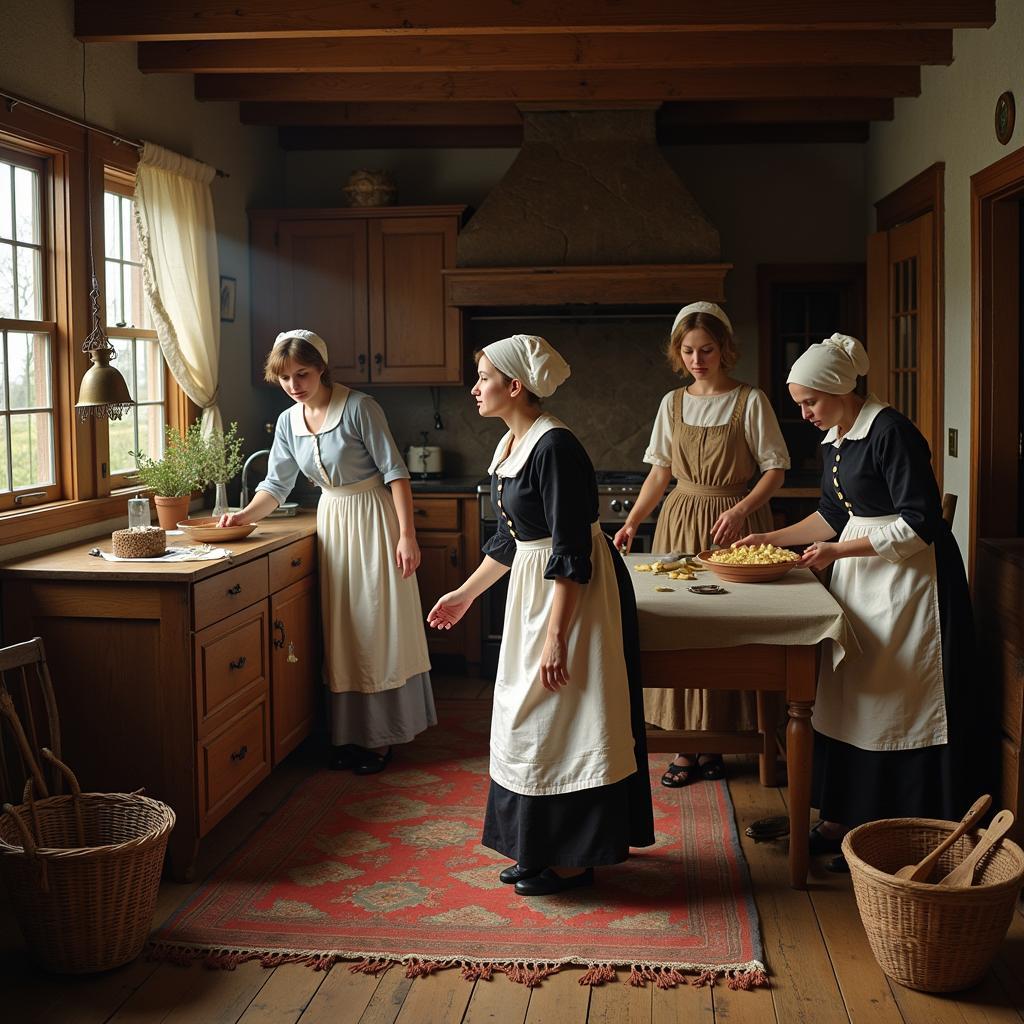The rigid social structure of 17th-century Puritan New England meticulously defined the roles of men and women. Rooted in religious doctrine and a firm belief in predestination, Puritan communities viewed these distinct spheres as divinely ordained, essential for a harmonious and godly society. This societal order, however, often placed limitations on individual aspirations and freedoms, particularly for women.
The Puritan Patriarch: Head of Household and Community
For Puritan men, life revolved around fulfilling their God-given roles as heads of households and leaders within the community. Their responsibilities encompassed providing for their families, upholding religious principles, and participating in civic duties. Farming, trade, and various crafts formed the backbone of their economic contributions, ensuring the material well-being of their households.
Religious devotion played a paramount role in a Puritan man’s life. Regular church attendance, Bible study, and fervent prayer were non-negotiable aspects of their daily routines. Furthermore, men held positions of authority within the church, serving as ministers, elders, and deacons, responsible for guiding the spiritual life of the community.
Beyond the home and church, Puritan men actively participated in civic affairs. Town meetings, where they discussed and voted on matters of local governance, exemplified their commitment to the well-being of the community. This active involvement in both religious and civic life solidified their position as leaders within the Puritan social hierarchy.
The Puritan Woman: Domesticity and Subservience
Puritan women, in contrast, found their lives largely confined to the domestic sphere. Their primary roles revolved around being obedient wives, nurturing mothers, and diligent homemakers. These roles, while considered essential for the smooth functioning of the household, often overshadowed their individual talents and aspirations.
 Puritan women engaged in domestic chores
Puritan women engaged in domestic chores
Within the home, women shouldered the responsibility of managing the household, caring for children, and tending to the needs of their husbands. Cooking, cleaning, sewing, and gardening consumed their days, leaving little room for pursuits outside the domestic realm. Education, while valued for boys, was often deemed unnecessary for girls, further limiting their opportunities for intellectual growth and personal fulfillment.
Religious piety remained paramount for Puritan women as well. Regular church attendance and participation in religious instruction were expected, but their roles within the church remained largely passive. Women were generally excluded from positions of authority or leadership, reinforcing their subordinate status within the patriarchal structure of Puritan society.
Challenges and Transformations
While the prescribed gender roles may appear rigid and restrictive from a modern perspective, it’s important to acknowledge the nuances and complexities within Puritan society. Some women, through their writing or involvement in religious debates, challenged the limitations imposed upon them, albeit often subtly and within the confines of acceptable discourse.
Furthermore, the harsh realities of colonial life, with its constant struggle for survival and frequent encounters with disease and hardship, often necessitated a degree of flexibility and adaptability in gender roles. Women, at times, had to assume responsibilities traditionally assigned to men, demonstrating their resilience and resourcefulness in the face of adversity.
Conclusion
Understanding the gender roles within Puritan society provides valuable insights into the social, religious, and cultural landscape of early America. While these roles, steeped in religious doctrine and tradition, may seem restrictive by today’s standards, they offer a glimpse into a society grappling with the challenges of establishing a new world order. The legacy of these roles, with its emphasis on hard work, piety, and communal responsibility, continues to resonate, albeit in evolved forms, within American culture today.
FAQ
1. Did all Puritan women conform to these strict gender roles?
While the majority adhered to societal expectations, some women challenged these norms through their writing or involvement in religious debates, albeit subtly.
2. How did the harsh realities of colonial life impact gender roles?
The demanding circumstances often required flexibility, with women sometimes assuming responsibilities traditionally assigned to men.
3. Did Puritan women have any opportunities for education?
Education was primarily valued for boys, limiting girls’ access to formal learning.
4. What influence did religion have on gender roles?
Religion played a central role, with biblical interpretations used to justify the distinct spheres of men and women.
5. How do these historical gender roles inform our understanding of American culture today?
While significantly evolved, the legacy of Puritan values, such as hard work, piety, and communal responsibility, continues to shape aspects of American culture.
For further assistance, please contact us at:
Phone Number: 02043854663
Email: [email protected]
Address: Khu 34, Bắc Giang, 260000, Việt Nam.
Our dedicated customer support team is available 24/7 to address your inquiries.